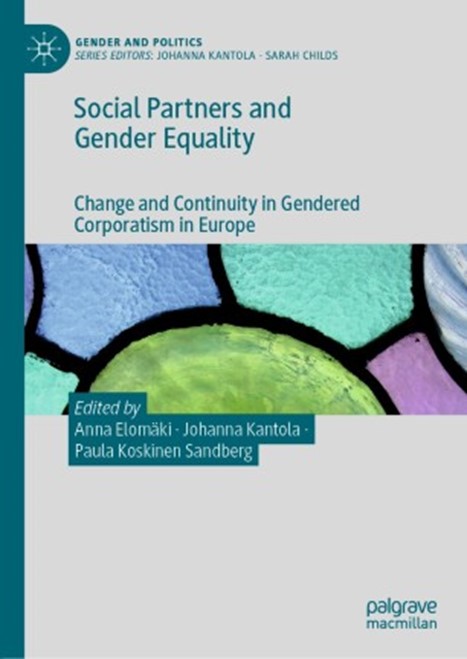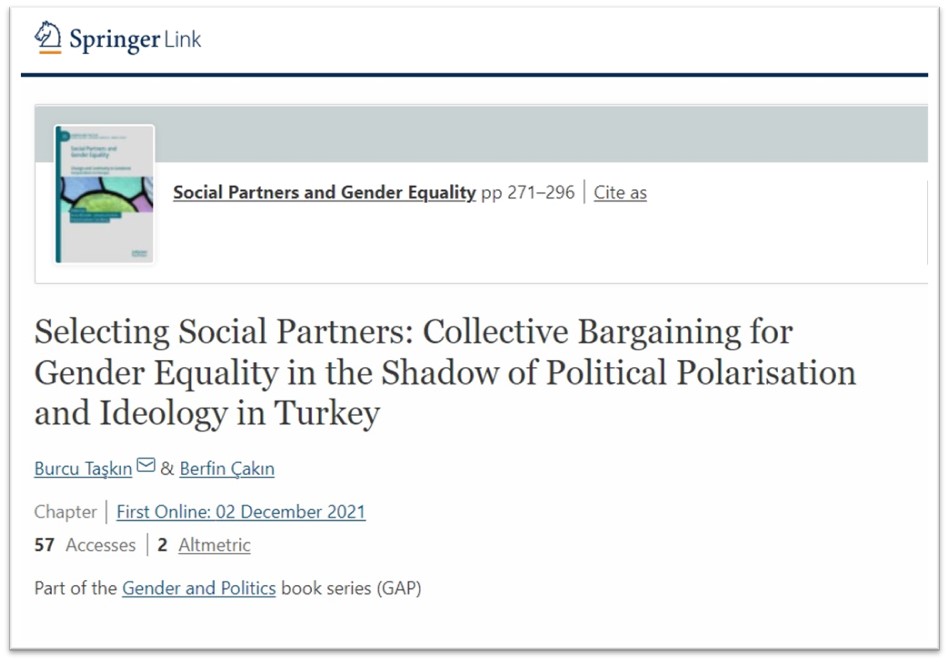Our university’s Faculty of Political Sciences, Political Science and Public Administration Department member Dr. Burcu TAŞKIN and PhD Student Berfin ÇAKIN’s book chapter in the edited volume “Social Partners and Gender Equality: Change and Continuity in Gendered Corporation in Europe” discussed the functioning of the social networks and confederations on gender equlity issues in Turkey with the section “Selecting Social Partners: Collective Bargaining for Gender Equality in the Shadow of Political Polarisation and Ideology in Turkey”.
In the book chapter, TAŞKIN and ÇAKIN brought an intersectional gender perspective that will influence the social partners and corporatist decision-making processes in Turkey on which the relations and bargaining between the central government/government/state and trade unions are based. While the book makes an important contribution to the literature by examining different countries, sectors and actors in gender and politics research, together but within the framework of EU countries, within the framework of a general theory, TAŞKIN and ÇAKIN addressed this gap in Turkey, but also by considering the impact of the EU. The Turkish context has some special features that distinguish it from many other European countries: It is one of the countries with the lowest union density in Europe, both overall and for women. Again, while it is in the top 20 economies in the economic development ranking, it is behind in the gender equality ranking. The research, which states that since the 2000s, the EU harmonization process and the approach of pluralistic policies have implemented more gender-equal policies in the business sector, and that non-state and international actors work in harmony in this area, the research underlined the changes in discourse and practice that take place from time to time. The study revealed that although there is an increase in women’s political participation, women labor force participation and partaking in sectoral organizations and this is not reflected in the decision-making processes. In this study, which states that there are relations between the state and non-state actors in Turkey that resemble a pluralist network but function as a corporatist, it is showed that increasing ideological-based social and political polarization both make it difficult for civil actors to act together, and that women are prevented from participating in economic life and the organizational field and that they have rights. The study claimed that they cannot collectively defend their demands independently of ideologies. In the light of the Neo-corporatist framework, this research found that although female union leaders hold higher managerial positions in left-wing unions and specifically target gender-related issues such as gender quotas, equal wages and parental leave, due to their ideological stances and legal restrictions, these issues are most likely to be included in collective bargaining. While arguing that this is an important obstacle, the authors suggested that the central government’s establishing a pluralistic and equal distance relationship with the unions will make an important contribution to the empowerment of women.
From the book chapter introduction bulletin:
“Although the legal regulations promoted by Turkey’s EU harmonization process have strengthened the number of NGOs and trade unions and increased the representation of women in decision-making bodies, the EU’s gender equality incentives, political polarization between unions and the conflict between the state and some unions weakened by local factors such as symbiotic relationship. Based on semi-structured in-depth interviews with three confederation presidents between 2009 and 2020 and new data from their public discourse, this section examines how political polarization in Turkey hinders the representation of women’s interests in the collective bargaining process. In light of the neo-corporatist framework, although female union leaders hold higher managerial positions in left-wing unions and specifically target gender-related issues such as quotas, equal pay and parental leave, their ideological stances and legal restrictions are the most important determinants in their inclusion in collective bargaining.”


